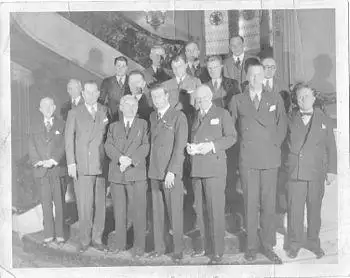The Technical Alliance was a group of engineers, scientists, and technicians based in New York City, formed towards the end of 1919 by American engineer Howard Scott. The Alliance started an Energy Survey of North America, aimed at documenting the wastefulness of the capitalist system.[1]
The Technical Alliance advocated a more rational and productive society headed by technical experts, but their survey work failed to have a significant impact. Although some waste was documented, the "prosperity and conservatism of the 1920s undermined the political orientation of the Technical Alliance", and it disbanded in 1921,[1][2][3]:37 and the energy survey was not completed.[3]:61–62
The Technical Alliance was by no means a mass organization, but it did have some notable members and technical experts. Apart from Scott, other members of the Technical Alliance included:[3]:34–35
- Frederick L. Ackerman
- Carl C. Alsberg
- Alice Barrows
- Allen Carpenter
- Stuart Chase
- L.K. Comstock
- Bassett Jones
- Robert H. Kohn
- Benton MacKaye
- Leland Olds
- Charles P. Steinmetz
- Richard C. Tolman
- John C. Vaughan
- Thorstein Veblen
- Charles H. Whitaker
References
- ^ a b Beverly H. Burris (1993). Technocracy at work State University of New York Press, p. 28.
- ^ Howard P. Segal (2005). Technological Utopianism in American Culture Syracuse University Press, p. 121.
- ^ a b c William E. Aikin (1977). Technocracy and the American Dream: The Technocracy Movement 1900-1941, University of California Press
